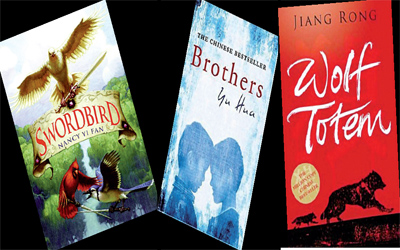As much of the international literary market looks for a way out of the global slump caused by the financial crisis, Chinese publishing houses are focusing on boosting cooperation and increasing Chinese books' global reach. Frequently on the agenda at the recent Beijing International Book Fair, discussions between Chinese publishers and their foreign counterparts about how to improve the industry are moving forward.
 |
|
Chinese books that have entered global market. [Global Times] |
The talks and discussions identified several challenges that lie ahead. The complexity of translation is on top of the list. One obvious obstacle is that because so few Western publishers can read Mandarin, it is very hard for them to evaluate a book's content and its potential in the Western market. More importantly, even if a book is translated, there is ultimately a limit to books about Chinese culture and philosophy that the market can absorb. Literal translation may also not accurately retell the story in another language.
Another challenge of publishing Chinese works in the West is the lack of knowledge about Chinese writers.
"The authors are unknown outside of China, so while they may be producing best-selling titles in China, in the United States or the UK, they are 'new' authors and publishers must build their brands. It takes a great deal of effort and marketing muscle to promote works and make them stand out against the many other books in the marketplace," explained Brian Murray, president of HarperCollins Publishers Worldwide.
Professor Paul Richardson, Chairman of China Publishing, an agency that focuses on helping Chinese publishers reach foreign markets more effectively, agreed that there is still a long way to go for Chinese books to succeed on the international scene. He said that in the UK only a limited number of books on China, whether by Chinese or foreign authors, make it onto bestseller lists. Jiang Rong's Wolf Totem, whose English copyright won a US$100,000 bid from British Penguin Group, also fell short of his expectation.
Richardson suggested that co-authoring with a known Western author or expert, or utilizing a Western general editor more familiar with target audiences, may help improve the situation.
Chinese Symbols, which will be published in the UK by Compendium in October has adopted this strategy. A series of small-format books from China's Yilin Press was chosen to create a beautifully illustrated book for the West with selected parts of the original content. According to Richardson, although the text was written by Chinese experts, he added an introduction explaining the special status of symbols in Chinese culture, which he hopes can help build a bridge between the Chinese content and a Western readership.
The English version of Yu Dan's bestseller Confucius from the Heart: Ancient Wisdom for Today's World published by Macmillan, made sure that the translation was done by someone who understood the author and potential market equally. Esther Tyldesley, who holds a degree in Chinese language, literature and translation from Cambridge University and spent three years working in China, translated the text.
"The Chinese version includes seven parts while the English version has been integrated into six parts. Instead of translating word by word, Esther Tyldesley has taken Western readers' reading habits and understanding into consideration. The translator has also had several long and deep talks with the author Yu Dan, exchanging ideas on how to make it the work more accessible to Western audiences," explained Janet Chan, sales and marketing manager of Macmillan Asia.
Chinese publishers are also working on developing books that are 'born international' by taking into consideration the Western mechanism of the publishing market. Stephen Bourne, chief executive of Cambridge University Press emphasized that bibliographies and footnotes are essential for a high-quality books, especially for academic texts. However, Chinese authors and publishers sometimes overlook these elements.
On the Chinese side, several programs have been initiated to fund international expansion.The Going Global Program supported by China's General Administration of Press and Publication (GAPP), is one of the strategies currently in place. According to Wu Shulin, vice minister of GAPP, from 2006-2008 the program funded 990 Chinese book translation projects for more than 150 publishers in 36 countries, involving over 1,300 titles and 21 languages.
Despite the initiative and growing focus on the international market, China is still facing an increasing number of imported works in relation to the number of exports, echoing international publishers' view that much work remains to be done.
(Global Times September 8, 2009)